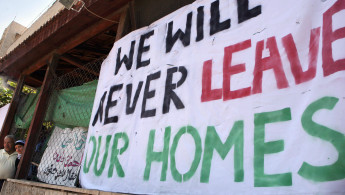Israel approves property seizures in East Jerusalem
Palestinian officials and experts have warned that the recent ruling of Israel's Supreme Court to apply the Absentees' Property Law in occupied East Jerusalem could prejudice the rights of thousands of Palestinian refugees.
Israel's Supreme Court has ruled that the law, which was enacted in 1948, can be applied to East Jerusalem to allow confiscation of property whose owners live in the West Bank, Gaza Strip or abroad.
The Palestinian minister for Jerusalem affairs and the city's governor, Adnan al-Husseini, said on Thursday that the decision was aimed at "looting Palestinian rights, property and land", adding that the Palestinian Authority hoped to pursue the matter of settlements in the International Criminal Court.
Zakariya Oudeh, a member of the Civil Coalition for the Defence of Palestinian Rights in Jerusalem, said the court's decision was part of the Israeli policy of escalation against the Palestinians, and despite earlier rulings that said the law did not apply to Palestinian property inside Jerusalem.
Osama Halaby, an expert on Israeli law and the absentees' property, said: "The court decided clearly that the law applies to East Jerusalem, but it did not apply it to the Palestinians of the West Bank.
"Its application is restricted by conditions such as the prior consent, the exhaustion of other legal instruments and only in extraordinary cases, but it did not define these extraordinary cases," he said.
Mohammad Jbara, a Palestinian lawyer, said that "the application of the law to natives of Jerusalem constitutes a problem for the Israeli law and the international law".
Jbara said the supreme court ruling reversed the ruling of the lower central court in Jerusalem, "as well as the judicial precedent, which I had personally succeeded in obtaining there after the enforcement of the absentees' law on the property of the West Bankers in Jerusalem.
"The is illogical in such circumstances and because the Palestinians exist under effective Israeli military rule and not in an enemy country, in addition to the fact that Jerusalem has become an integral part of Israel by a political decision," he said.
This is an edited translation of the original Arabic.





 Follow the Middle East's top stories in English at The New Arab on Google News
Follow the Middle East's top stories in English at The New Arab on Google News


